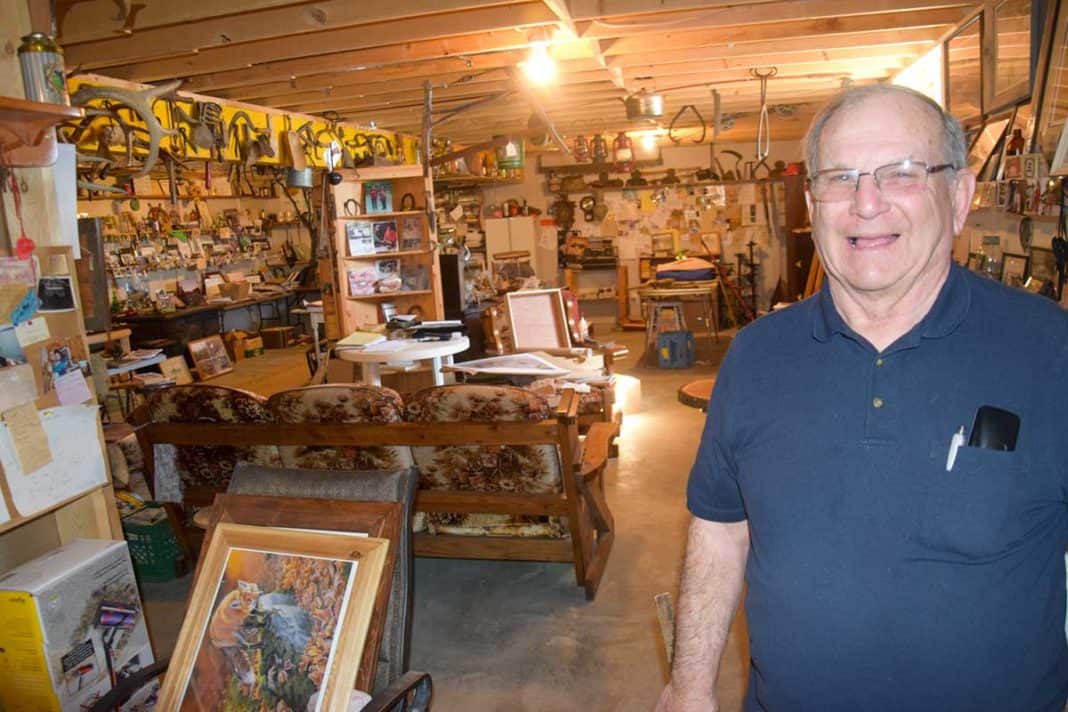SHEGUIANDAH – One of Manitoulin’s greatest conservation champions, Bill Strain, returned to the role of Little Current Fish and Game Club (LCFGC) president on a temporary basis in 2005. This past week he announced he would once again be stepping down from the role he had held for several years in the 1990s.
“I agreed to be president around 2005 when Rick Gjos stepped down, it was only supposed to be for six months,” he laughed.
The Expositor sat down with the former educator and now retired owner-operator of Sheguiandah’s White Haven Cottages at his home nestled on the shores of Bass Lake to chat about his tenure at the helm of LCFGC and the changes he has seen over the many decades he has been involved in Island conservation efforts.
Mr. Strain grew up guiding fishermen (usually American) on the waters of Manitoulin, but found his main vocation to be in the classroom, even as his passion included the family’s fishing resort his father founded on the shores of Sheguiandah Bay. His daughter and son-in-law continue to operate White Haven Cottages as the third generation.
So, it is not surprising that in 2006, shortly after he resumed the reins of LCFGC, Mr. Strain decided to approach the then principal of Little Current Public School Margaret Stringer (current Rainbow District School Board Manitoulin trustee) with a novel idea.
“I asked her if she would be interested in bringing the school kids out when we were harvesting the eggs for the walleye hatchery,” he recalled.
Mr. Strain had a fair bit of experience organizing fields trips, beginning with his own experiences as a student at the fabled Haileybury School of Mines. “We would go out on a lot of geology field trips,” he said. When he began teaching in Espanola, Mr. Strain became the go-to guy for trips onto the land.
The trips to the hatchery operations were an instant hit. “Then Manitoulin Streams jumped in and we took things to the next level,” recalled Mr. Strain.
Thanks to donations and support, including that of Ramakko’s Source for Adventure, a Sudbury-based outdoor and sporting goods company whose owner is a long-time member of the LCFGC, the club was able to provide each Grade 4 student in the school with their very own fishing rod. When the effort expanded to include students from Lakeview School, C.C. McLean and Assiginack Public School, those students also received the rods.
Although last year’s students missed out on the opportunity to visit the hatchery and egg-harvesting efforts, Mr. Strain and his fellow club members made sure they received their rods.
“It is one of the greatest feelings,” he said, recounting the moment he saw a young man coming up from the docks at the Port of Little Current proudly carrying a good-sized walleye that he had just caught. “He was carrying a four-five pound walleye and one of the fishing rods we gave out.”
That story highlights one of the major accomplishments of the LCFGC and one of the things Mr. Strain is most proud of having been a part of during his tenure.
“When I was younger, you didn’t catch walleye around here anymore,” he said. “I grew up at that stream and when I was eight, nine, 10 years old I observed what was happening. Smelts had disappeared; overfishing, commercial fishing and netting, the walleye had pretty much disappeared.”
So when the LCFGC set out to revive the walleye fishery around 1986, Mr. Strain and other club members like Kevin Hutchinson, Doug Hore and Bob MacDonald jumped on board, taking courses and learning how to set up a hatchery and fish ponds.
“We made just about every mistake there was to make,” laughed Mr. Strain. “The Ministry of Natural Resources told us it would probably take about 10 to 15 years to see any impact.” Undaunted, the club set out to raise the required funds and supply the vital volunteer elbow grease needed to pull the project off.
Ten years later, around the year 2000, Mr. Strain described the feeling of awe he felt when his flashlight played out across the bay at the mouth of Bass Creek one spring night while on shoreline patrol. Reflecting back at him were the luminescent eyes of literally thousands of walleye, spreading out across the waters of the bay like the stars hanging in the night sky—they had returned to their birthplace to spawn.
“We couldn’t have done it without the support of businesses, who have been wonderful to the club every year, or the incredible work of our volunteers,” said Mr. Strain. “The guys have been amazing. Every year they come out. You put out the call that we need to get the nets out, or we have to harvest the fry at the ponds, and everybody shows up in the early morning.”
It is vital to pull the fry from the ponds around 40-45 days, before they get too large. “They turn cannibalistic, you could lose most of the crop in a matter of days,” he said.
Many of the club members are getting older these days and Mr. Strain said they need to see a bit more new blood coming in. “We have a few younger members, but lots of them are around my age, I’m a year away from 80,” he said.
Before heading back to the office, The Expositor was taken into the basement of Mr. Strain’s home and into a display that would be the envy of many an established museum. Old photographs and books recalling the many characters of days gone bye on the bay and its islands join old implements, flint arrowheads and tools ranging from pre-contact flint scrappers to trade axes and ice saws. Every wall, every table, every available space contains a captivating tale.
“Bill Caesar (Island historian, educational colleague and friend) said that when Bill dies he wants to be the first person here for the yard sale,” laughs Mr. Strain’s wife Linda, who he describes as his stalwart support in both the operation of the Whitehaven Cottages resort and his conservation efforts. “I couldn’t have done it without her,” he said.
Mr. Strain noted that land-based teachings, grown in popularity in Indigenous communities, should be a major focus in every school and community.
“We need that connection,” he said. “We need to know how important it is to preserve and protect our natural resources so future generations are able to enjoy understand and enjoy what we grew up with, now more than ever.”
Mr. Strain admonishes those who go out for a day on the lake fishing to consider taking a catch and release philosophy, especially when it comes to the larger breeding fish whose spawning ensures a healthy population for ensuing years.





